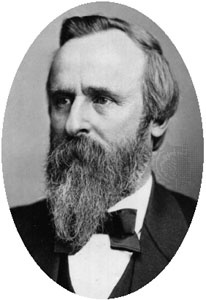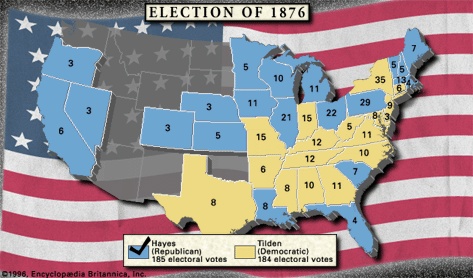Hayes, Rutherford B.
president of United States
in full Rutherford Birchard Hayes
born October 4, 1822, Delaware, Ohio, U.S.
died January 17, 1893, Fremont, Ohio
 19th president of the United States (1877–81), who brought post-Civil War Reconstruction to an end in the South and who tried to establish new standards of official integrity after eight years of corruption in Washington, D.C. He was the only president to hold office by decision of an extraordinary commission of congressmen and Supreme Court justices appointed to rule on contested electoral ballots. (For a discussion of the history and nature of the presidency, see presidency of the United States of America.)
19th president of the United States (1877–81), who brought post-Civil War Reconstruction to an end in the South and who tried to establish new standards of official integrity after eight years of corruption in Washington, D.C. He was the only president to hold office by decision of an extraordinary commission of congressmen and Supreme Court justices appointed to rule on contested electoral ballots. (For a discussion of the history and nature of the presidency, see presidency of the United States of America.)Hayes was the son of Rutherford Hayes, a farmer, and Sophia Birchard. After graduating from Kenyon College at the head of his class in 1842, Hayes studied law at Harvard, where he took a bachelor of laws degree in 1845. Returning to Ohio, he established a successful legal practice in Cincinnati, where he represented defendants in several fugitive-slave cases and became associated with the newly formed Republican Party. In 1852 he married Lucy Ware Webb (Lucy Hayes (Hayes, Lucy)), a cultured and unusually well-educated woman for her time. After combat service with the Union army, he was elected to Congress (1865–67) and then to the Ohio governorship (1868–76).
 Cabinet of President Rutherford B. HayesIn 1875, during his third gubernatorial campaign, Hayes attracted national attention by his uncompromising advocacy of a sound currency backed by gold. The following year he became his state's favourite son at the national Republican nominating convention, where a shrewdly managed campaign won him the presidential nomination. Hayes's unblemished public record and high moral tone offered a striking contrast to widely publicized accusations of corruption in the administration of President Ulysses S. Grant (Grant, Ulysses S.) (1869–77). An economic depression, however, and Northern disenchantment with Reconstruction policies in the South combined to give Hayes's Democratic opponent, Samuel J. Tilden (Tilden, Samuel J), a popular majority, and early returns indicated a Democratic victory in the electoral college as well. Hayes's campaign managers challenged the validity of the returns from South Carolina, Florida, and Louisiana, and as a result two sets of ballots were submitted from the three states. The ensuing electoral dispute became known as the Tilden-Hayes affair. Eventually a bipartisan majority of Congress created a special Electoral Commission to decide which votes should be counted. As originally conceived, the commission was to comprise seven Democrats, seven Republicans, and one independent, the Supreme Court justice David Davis (Davis, David). Davis refused to serve, however, and the Republican Joseph P. Bradley (Bradley, Joseph P.) was named in his place. While the commission was deliberating, Republican allies of Hayes engaged in secret negotiations with moderate Southern Democrats aimed at securing acquiescence to Hayes's election. On March 2, 1877, the commission voted along strict party lines to award all the contested electoral votes to Hayes, who was thus elected with 185 electoral votes to Tilden's 184. The result was greeted with outrage and bitterness by some Northern Democrats, who thereafter referred to Hayes as “His Fraudulency.” (See primary source document: Inaugural Address (Rutherford B. Hayes: Inaugural Address). See also Cabinet of President Rutherford B. Hayes.)
Cabinet of President Rutherford B. HayesIn 1875, during his third gubernatorial campaign, Hayes attracted national attention by his uncompromising advocacy of a sound currency backed by gold. The following year he became his state's favourite son at the national Republican nominating convention, where a shrewdly managed campaign won him the presidential nomination. Hayes's unblemished public record and high moral tone offered a striking contrast to widely publicized accusations of corruption in the administration of President Ulysses S. Grant (Grant, Ulysses S.) (1869–77). An economic depression, however, and Northern disenchantment with Reconstruction policies in the South combined to give Hayes's Democratic opponent, Samuel J. Tilden (Tilden, Samuel J), a popular majority, and early returns indicated a Democratic victory in the electoral college as well. Hayes's campaign managers challenged the validity of the returns from South Carolina, Florida, and Louisiana, and as a result two sets of ballots were submitted from the three states. The ensuing electoral dispute became known as the Tilden-Hayes affair. Eventually a bipartisan majority of Congress created a special Electoral Commission to decide which votes should be counted. As originally conceived, the commission was to comprise seven Democrats, seven Republicans, and one independent, the Supreme Court justice David Davis (Davis, David). Davis refused to serve, however, and the Republican Joseph P. Bradley (Bradley, Joseph P.) was named in his place. While the commission was deliberating, Republican allies of Hayes engaged in secret negotiations with moderate Southern Democrats aimed at securing acquiescence to Hayes's election. On March 2, 1877, the commission voted along strict party lines to award all the contested electoral votes to Hayes, who was thus elected with 185 electoral votes to Tilden's 184. The result was greeted with outrage and bitterness by some Northern Democrats, who thereafter referred to Hayes as “His Fraudulency.” (See primary source document: Inaugural Address (Rutherford B. Hayes: Inaugural Address). See also Cabinet of President Rutherford B. Hayes.)As president, Hayes promptly made good on the secret pledges made during the electoral dispute. He withdrew federal troops from states still under military occupation, thus ending the era of Reconstruction (1865–77). His promise not to interfere with elections in the former Confederacy ensured a return there of traditional white Democratic supremacy. He appointed Southerners to federal positions, and he made financial appropriations for Southern improvements. These policies aroused the animosity of a conservative Republican faction known as the Stalwarts (Stalwart), who were further antagonized by the president's efforts to reform the civil service by substituting nonpartisan examinations for political patronage. Hayes's demand for the resignation of two top officials in the New York customhouse (including Chester Arthur (Arthur, Chester A.), the future president) provoked a bitter struggle with New York senator Roscoe Conkling (Conkling, Roscoe).
During the national railroad strikes of 1877, Hayes, at the request of state governors, dispatched federal troops to suppress rioting. His administration was under continual pressure from the South and West to resume silver coinage, outlawed in 1873. Many considered this proposal inflationary, and Hayes sided with the Eastern, hard-money (gold) interests. Congress, however, overrode his veto of the Bland-Allison Act (1878), which provided for government purchase of silver bullion and restoration of the silver dollar as legal tender. In 1879 Hayes signed an act permitting women lawyers to practice before the Supreme Court.
Hayes refused renomination by the Republican Party in 1880, contenting himself with one term as president. In retirement he devoted himself to humanitarian causes, notably prison reform and educational opportunities for Southern black youth. (For an additional writing by Hayes, see Wealth in the Hands of a Few (Rutherford B. Hayes: Wealth in the Hands of the Few).)
Additional Reading
The writings of Hayes are collected in Charles Richard Williams (ed.), Diary and Letters of Rutherford Birchard Hayes, Nineteenth President of the United States, 5 vol. (1922–26, reprinted 1971); and T. Harry Williams (ed.), Hayes: The Diary of a President (1964), which includes entries describing his nomination and campaign as presidential candidate, the disputed election and its resolution, and his term as president.Biographies include Charles Richard Williams, The Life of Rutherford Birchard Hayes, Nineteenth President of the United States, 2 vol. (1914, reissued 1971); H.J. Eckenrode and Pocahontas Wilson Wight, Rutherford B. Hayes, Statesman of Reunion (1930, reprinted 1988); Harry Barnard, Rutherford B. Hayes and His America (1954, reissued 1992); T. Harry Williams, Hayes of the Twenty-Third: The Civil War Volunteer Officer (1965, reissued 1994), which utilizes Hayes's diaries and correspondence to portray his experiences during four years as a regimental commander in the Union army; and Ari Hoogenboom, Rutherford B. Hayes: Warrior and President (1995), a study of Hayes's life and career that highlights his dedication to human rights reforms.C. Vann Woodward, Reunion and Reaction: The Compromise of 1877 and the End of Reconstruction, 2nd ed. rev. (1956); and Keith Ian Polakoff, The Politics of Inertia: The Election of 1876 and the End of Reconstruction (1973), provide differing arguments as to the reasons Hayes won the disputed 1876 election. Ari Hoogenboom, The Presidency of Rutherford B. Hayes (1988), includes an assessment of his conduct of civil service reforms.Emily Apt Geer, First Lady: The Life of Lucy Webb Hayes (1984), is based on Lucy Hayes's personal papers.
- University of Padua
- University of Pennsylvania
- University of Perugia
- University of Pittsburgh
- University of Poitiers
- University of Pretoria
- University of Rhode Island
- University of Richmond
- University of Rochester
- University of Rome
- University of Saint Andrews
- University of Salamanca
- University of Salerno
- University of San Francisco
- University of Sevilla
- University of Siena
- University of South Carolina
- University of South Dakota
- University of Southern California
- University of Southern Mississippi
- University of Sydney
- University of Tennessee
- University of Texas
- University of the District of Columbia
- University of the Pacific